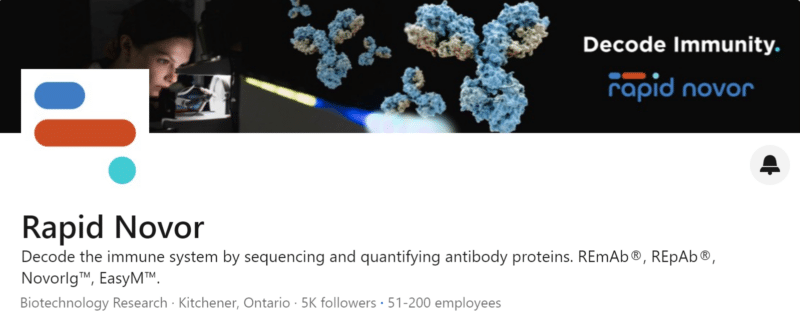Le Bihan, T., Nunez de Villavicencio Diaz, T., Reitzel, C. et al. De novo protein sequencing of antibodies for identification of neutralizing antibodies in human plasma post SARS-CoV-2 vaccination. Nat Commun 15, 8790 (2024). https://doi.org/10.1038/s41467-024-53105-8

Workflow for de novo and IgSeq for the analysis of human antibody repertoires from antigen-specific IgG and peripheral blood. Two different types of samples were taken and analyzed; the bottom branch is the procedure of generating a reference database of immunoglobulin V-region by next-generation sequencing (NGS) of the immunized individual’s B-cell repertoire. The branch above describes the analysis of serum IgG involving the purification and the proteomic analysis of affinity-purified serum antibodies (de novo, top) alongside VH: VL pairing and NGS of peripheral B cell V gene repertoires (BCR-seq, bottom).
Key Takeaways
- REpAb® Antibody Discovery: Employed REpAb® polyclonal sequencing to sequence polyclonal IgG directly from human plasma,
- accessing diversity unavailable to B-cell sequencing alone.
- Recombinant Antibody Production: Produced 12 recombinant antibodies from the natural pAb to the Moderna Spikevax vaccine, with six generated exclusively through de novo sequencing, and four exhibiting binding affinities comparable to or higher than the original pAb.
- Neutralization Capabilities: The generated antibodies demonstrated strong neutralizing capabilities against the target antigen.
- Comprehensive IgG Analysis: Emphasized the importance of sequencing the circulating IgG pool for a more comprehensive understanding of the immune response compared to B-cell analysis alone.
Summary
We demonstrate the use of REpAb® for sequencing polyclonal IgG enriched from human plasma, leveraging a comprehensive approach that includes de novo sequencing, proteomics, bioinformatics, protein and peptide separation, and advanced sequencing techniques. Our research focuses on analyzing the IgG antibody response of a single patient following immunization with the Moderna Spikevax mRNA COVID-19 vaccine.
By directly sequencing the natural polyclonal response, we generated 12 recombinant antibodies, with six displaying equal or superior binding affinities compared to the original polyclonal antibodies. Notably, six antibodies were derived through de novo sequencing. Neutralization assays confirmed that these antibodies possess robust neutralizing capabilities against the target antigen.
This case study underscores the value of sequencing polyclonal IgG antibodies, providing a more accurate representation of the functional and circulating antibody pool compared to traditional B-cell repertoire analysis. Direct knowledge of the IgG response can enhance the therapeutic antibody discovery process, focusing selection and characterization efforts on candidates with higher therapeutic potential.
Talk to Our Scientists.
We Have Sequenced 10,000+ Antibodies and We Are Eager to Help You.
Through next generation protein sequencing, Rapid Novor enables reliable discovery and development of novel reagents, diagnostics, and therapeutics. Thanks to our Next Generation Protein Sequencing and antibody discovery services, researchers have furthered thousands of projects, patented antibody therapeutics, and developed the first recombinant polyclonal antibody diagnostics.
Talk to Our Scientists.
We Have Sequenced 9000+ Antibodies and We Are Eager to Help You.
Through next generation protein sequencing, Rapid Novor enables timely and reliable discovery and development of novel reagents, diagnostics, and therapeutics. Thanks to our Next Generation Protein Sequencing and antibody discovery services, researchers have furthered thousands of projects, patented antibody therapeutics, and ran the first recombinant polyclonal antibody diagnostics

